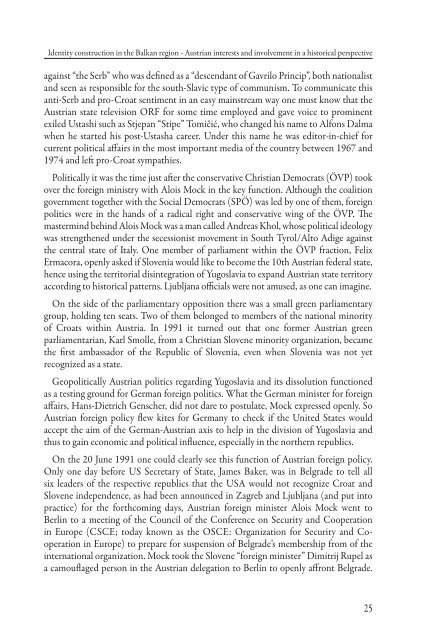Cultural Identity Politics in the (Post-)Transitional Societies
Cultural Identity Politics in the (Post-)Transitional Societies
Cultural Identity Politics in the (Post-)Transitional Societies
You also want an ePaper? Increase the reach of your titles
YUMPU automatically turns print PDFs into web optimized ePapers that Google loves.
<strong>Identity</strong> construction <strong>in</strong> <strong>the</strong> Balkan region - Austrian <strong>in</strong>terests and <strong>in</strong>volvement <strong>in</strong> a historical perspective<br />
aga<strong>in</strong>st “<strong>the</strong> Serb” who was def<strong>in</strong>ed as a “descendant of Gavrilo Pr<strong>in</strong>cip”, both nationalist<br />
and seen as responsible for <strong>the</strong> south-Slavic type of communism. To communicate this<br />
anti-Serb and pro-Croat sentiment <strong>in</strong> an easy ma<strong>in</strong>stream way one must know that <strong>the</strong><br />
Austrian state television ORF for some time employed and gave voice to prom<strong>in</strong>ent<br />
exiled Ustashi such as Stjepan “Stipe” Tomičić, who changed his name to Alfons Dalma<br />
when he started his post-Ustasha career. Under this name he was editor-<strong>in</strong>-chief for<br />
current political affairs <strong>in</strong> <strong>the</strong> most important media of <strong>the</strong> country between 1967 and<br />
1974 and left pro-Croat sympathies.<br />
Politically it was <strong>the</strong> time just after <strong>the</strong> conservative Christian Democrats (ÖVP) took<br />
over <strong>the</strong> foreign m<strong>in</strong>istry with Alois Mock <strong>in</strong> <strong>the</strong> key function. Although <strong>the</strong> coalition<br />
government toge<strong>the</strong>r with <strong>the</strong> Social Democrats (SPÖ) was led by one of <strong>the</strong>m, foreign<br />
politics were <strong>in</strong> <strong>the</strong> hands of a radical right and conservative w<strong>in</strong>g of <strong>the</strong> ÖVP. The<br />
masterm<strong>in</strong>d beh<strong>in</strong>d Alois Mock was a man called Andreas Khol, whose political ideology<br />
was streng<strong>the</strong>ned under <strong>the</strong> secessionist movement <strong>in</strong> South Tyrol/Alto Adige aga<strong>in</strong>st<br />
<strong>the</strong> central state of Italy. One member of parliament with<strong>in</strong> <strong>the</strong> ÖVP fraction, Felix<br />
Ermacora, openly asked if Slovenia would like to become <strong>the</strong> 10th Austrian federal state,<br />
hence us<strong>in</strong>g <strong>the</strong> territorial dis<strong>in</strong>tegration of Yugoslavia to expand Austrian state territory<br />
accord<strong>in</strong>g to historical patterns. Ljubljana officials were not amused, as one can imag<strong>in</strong>e.<br />
On <strong>the</strong> side of <strong>the</strong> parliamentary opposition <strong>the</strong>re was a small green parliamentary<br />
group, hold<strong>in</strong>g ten seats. Two of <strong>the</strong>m belonged to members of <strong>the</strong> national m<strong>in</strong>ority<br />
of Croats with<strong>in</strong> Austria. In 1991 it turned out that one former Austrian green<br />
parliamentarian, Karl Smolle, from a Christian Slovene m<strong>in</strong>ority organization, became<br />
<strong>the</strong> first ambassador of <strong>the</strong> Republic of Slovenia, even when Slovenia was not yet<br />
recognized as a state.<br />
Geopolitically Austrian politics regard<strong>in</strong>g Yugoslavia and its dissolution functioned<br />
as a test<strong>in</strong>g ground for German foreign politics. What <strong>the</strong> German m<strong>in</strong>ister for foreign<br />
affairs, Hans-Dietrich Genscher, did not dare to postulate, Mock expressed openly. So<br />
Austrian foreign policy flew kites for Germany to check if <strong>the</strong> United States would<br />
accept <strong>the</strong> aim of <strong>the</strong> German-Austrian axis to help <strong>in</strong> <strong>the</strong> division of Yugoslavia and<br />
thus to ga<strong>in</strong> economic and political <strong>in</strong>fluence, especially <strong>in</strong> <strong>the</strong> nor<strong>the</strong>rn republics.<br />
On <strong>the</strong> 20 June 1991 one could clearly see this function of Austrian foreign policy.<br />
Only one day before US Secretary of State, James Baker, was <strong>in</strong> Belgrade to tell all<br />
six leaders of <strong>the</strong> respective republics that <strong>the</strong> USA would not recognize Croat and<br />
Slovene <strong>in</strong>dependence, as had been announced <strong>in</strong> Zagreb and Ljubljana (and put <strong>in</strong>to<br />
practice) for <strong>the</strong> forthcom<strong>in</strong>g days, Austrian foreign m<strong>in</strong>ister Alois Mock went to<br />
Berl<strong>in</strong> to a meet<strong>in</strong>g of <strong>the</strong> Council of <strong>the</strong> Conference on Security and Cooperation<br />
<strong>in</strong> Europe (CSCE; today known as <strong>the</strong> OSCE: Organization for Security and Cooperation<br />
<strong>in</strong> Europe) to prepare for suspension of Belgrade’s membership from of <strong>the</strong><br />
<strong>in</strong>ternational organization. Mock took <strong>the</strong> Slovene “foreign m<strong>in</strong>ister” Dimitrij Rupel as<br />
a camouflaged person <strong>in</strong> <strong>the</strong> Austrian delegation to Berl<strong>in</strong> to openly affront Belgrade.<br />
25




